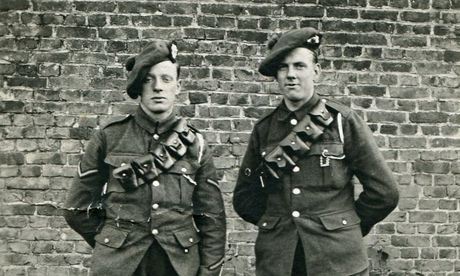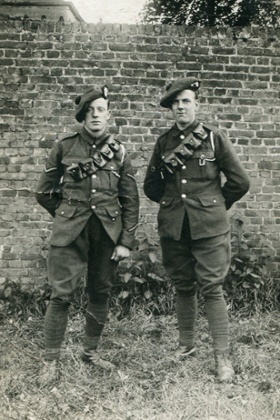
Snapshot: Grandpa’s lucky escape 100 years ago
On 22 May 2015 it was 100 years since the Quintinshill rail disaster in which more than 200 men from 1/7th Battalion the Royal Scots lost their lives near Gretna. They were on their way to Liverpool, heading for Gallipoli. The men were all from the Leith Battalion and are remembered on a memorial in Rosebank cemetery in Edinburgh. The name of my paternal grandfather, Henry McDonald, is engraved on the memorial although, by a strange twist, he was not on the train. At short notice, he had to go on training and so did not get on the train that fateful day.

Any paper records of troops travelling would have been lost in the fire caused by the explosion of gas cannisters after the collision so the engraver was probably given a battalion list to work from.
Though it was not spoken of during my childhood, his life must have been changed by this tragic event. To lose so many friends and comrades in such a way must have been a dreadful shock and a great loss. How strange it must have been to have seen his own name among those of his friends on a memorial.
Henry was born in 1894 and would have been 21 at the time. He had joined the territorial army as a teenager, attracted by the summer camp training, which was the nearest thing to a holiday in his experience. When war broke out, he served in Gallipoli, France and Belgium.
After the Quintinshill crash, he continued to serve in the transport division as a mule-runner, taking supplies and ammunition up and down the line. In the course of these duties, he became friendly with a baker in Waterloo, Belgium, who provided supplies of bread. After the war, the baker gave Henry a medallion, which he took home.
A little more than 20 years later, his son – my dad, also Henry but known as Harry – was serving as a baker with the catering corps in the same area during the second world war. He found the baker, who immediately recognised the medallion. The baker was due to retire and was keen for my dad to stay on in Belgium to continue his bakery business, but my dad wanted to return to Edinburgh. I don’t know what happened to the medallion.
Although I am thankful that Grandpa, of whom I have fond memories, was not on the train, the tragic events of 22 May 1915 remind me of the devastating effect the crash must have had on individuals, families and an entire community.
This photograph, taken in Lembecq, Flanders, shows Henry (on the right) with his younger brother Andrew, who also survived the war, although I don’t know whether he was in the Gretna crash or not.
Ruth Watson
Playlist: My boy’s homework triggered a memory
Just Who is the Five O’Clock Hero? by the Jam
“Hello, darlin’, I’m home again / Covered in shit and aches and pains”
Sean, my 13-year-old son, is at the dining-room table, head down, in deep concentration, busily writing away on his notepad computer. “What are you up to then?” I ask.
“I’m writing a story, it’s for my GCSE English mock exam,” he says.
“Well, don’t go using other people’s work,” I say gruffly. “Plagiarism has become a big issue in education.”
There is no reply. I return to classic literature – a backdated copy of the NME from the library. But my thoughts are side-tracked by the earlier exchange with Sean. I vividly remember sitting English O-levels in the mid-80s. I was required to write a short composition using a photograph to base the narrative on. I chose one of an elderly lady looking from her house window on to a busy high street. The essay would be an account of her memories. However, I remember having trouble with the ending. I had a brainwave! I wrote:
“From this window I’ve seen the whole world pass
From dawn to dusk I’ve heard the last laugh laughed
I’ve seen enough tears to wash away this street
I’ve heard wedding bells chime and a funeral march
When one life finishes another one starts”
I had lifted the chorus from the Jam’s Just Who is the Five O’Clock Hero? I didn’t tell anyone at the time, but the matter did play on my mind. Surely, some old fuddy-duddy at the Oxford exam board would notice my crime. As it turned out, it went unnoticed and I passed the English language O-level with a C grade.
One day I should thank Paul Weller for the inspiration. So while I may not be the best role model in that respect, the irony is that I became an English teacher (EFL) … so Sean and his sister Moe have to be extra vigilant with their homework with me around the house. Poor them!
Jason Murray
We love to eat: Mum’s bread pudding straight from the pan
Ingredients
Small loaf
1oz margarine
1oz suet
3oz sugar
1 dessertspoon spice (level)
6oz mixed dried fruit
1 large egg
Break bread into small pieces, soak for one hour in water. Strain water out completely. Break bread up with fork, mix in margarine, suet, sugar, spice and fruit – using fork. Add beaten egg. Turn into greased baking tin and cook for about 1½ hours on gas mark 3 (170C) until the top is brown and crisp. When cooked, sprinkle with sugar and serve from the tin.
No eye of newt or toe of frog are needed for this spell. A mixture of stale bread, fat, dried fruit and sugar, mixed up with an egg, are all I need to conjure up my mother. The spicy smell permeates the house as the mixture cooks, and there she is, cutting up the still warm bread pudding into thick squares and dishing it up straight from the pan. It didn’t last long with five greedy children.
My mum seemed surprised when I asked her to write down the recipe. “There isn’t one. I just put in whatever I have,” she said.
I suppose you learn to improvise in wartime. The ingredients and method above are what she wrote for me on a scrap of paper on her shopping-list pad. It’s the most precious recipe in my scrapbook.
It never tastes quite right when I cook it, but the smell is perfect and transports me back to our flat in Streatham, south London. Mum said you could put in some marmalade, if you had any, which is delicious.
I have a few more spells in my book of magic. Peaches topped with brown sugar, melted under the grill, calves’ liver fried with sage, Italian style, and a real continental cheesecake, all bring happy memories into my kitchen.
I must ask my husband if there is anything I cook that would bring me back for him when I’m gone. I suspect I already know the answer, sadly.
Carolyn Hawkes

